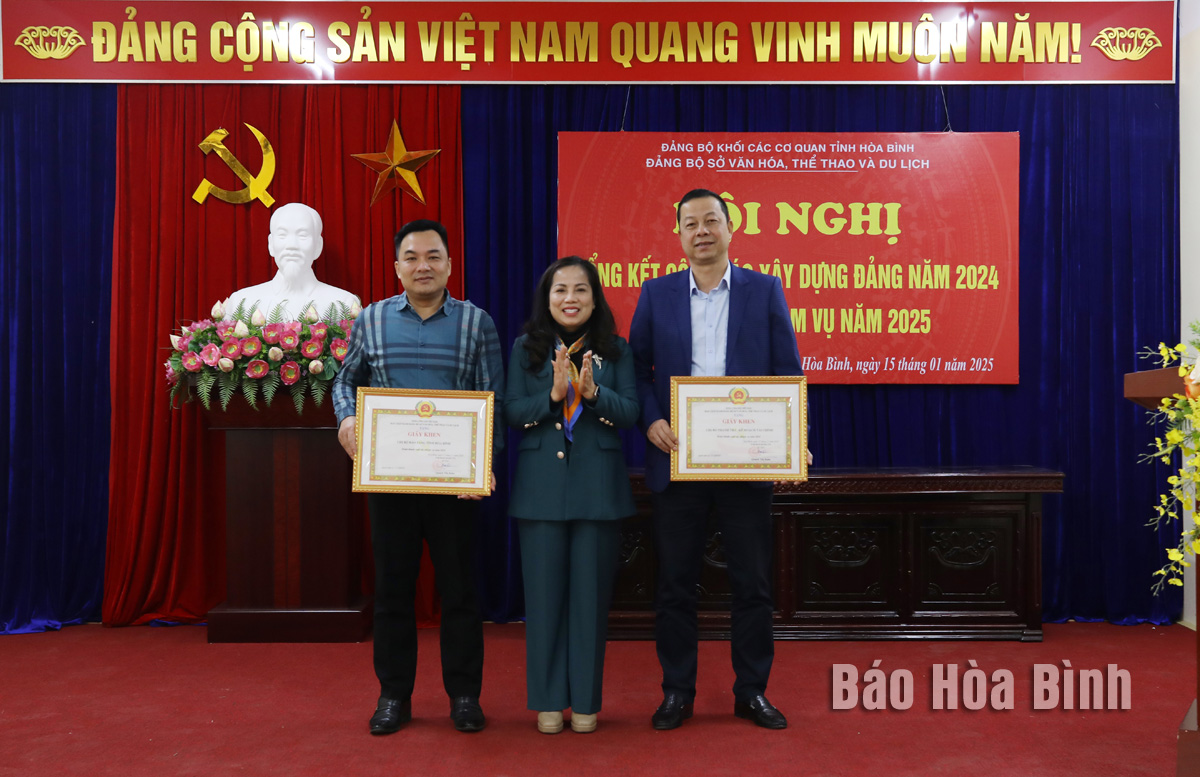
The Party Committee of the provincial Department of Culture, Sports, and Tourism convened a meeting on January 15 to evaluate Party building work in 2024 and set tasks for this year.

Leaders of the Department of Culture, Sports and Tourism of Hoa Binh province awarded certificates of merit to two party cells that successfully completed their tasks in 2024.
In 2024, the committee focused on leading and directing its cells in
building the Party and promoting the role of setting examples among its
members.
Efforts to enhance political and ideological
education for Party members, civil servants, public employees and labourers in
agencies and units, contributing the common achievements of the province. Last
year, Hoa Binh had Trai hamlet cave and Vanh village stone roof recongised as
special national heritage sites.
Other notable accomplishments included the
successful hosting of the Hoa Binh Culture and Tourism Week, provincial
athletes securing 135 medals, and a 9.9% year-on-year increase in tourist
arrivals to over 4.3 million and a 17.9% growth in tourism revenue to 4.7 trillion
VND (186 million USD) in revenue.
In 2025, the Party Committee will continue
leading the serious implementation of the Party Central Committee's directions
and conclusions regarding the restructuring of the organizational apparatus to
make it streamlined, efficient and effective.
Other goals include directing the organisation
of Party congresses at various levels and enrolling at least four new members.
As part of the conference, the committee
presented the certificate of merit from Party Committee of the provincial
Agencies' Bloc to an outstanding Party member during the 2020–2024 period as
well as the certificate of commendation to two Party cells and 22 members for
exemplary performance in 2024.
The clothing of women reflects the culture of the Muong, Thai, Tay, Dao, and Mong ethnic groups in the northern province of Hoa Binh.
Gongs hold a special place in the cultural and spiritual life of the Muong ethnic people in Hoa Binh province. More than musical instruments, they are an indispensable part of community rituals and collective memory, echoing through generations as a spiritual thread linking the past, present, and future.
Preserving and promoting the cultural values of the Muong ethnic group has become an urgent task in the current context, as many traditional values face the risk of fading away. This effort requires not only protecting the cultural identity but also eliminating outdated customs and developing a modern cultural lifestyle, contributing to sustainable values for the Muong community in Hoa Binh province.
The Muong ethnic culture, deeply rooted in Vietnam’s mountainous north, continues to be preserved and revitalised by dedicated individuals and communities determined to safeguard their ancestral identity.
The Muong group is one of the largest ethnic minorities in Vietnam, primarily found in Hoa Binh province. The Muong people in Hoa Binh boast a rich and diverse cultural treasure that reflects the unique identity of this ethnic group. Accounting for over 63% of the province's population, they have created and preserved numerous distinctive cultural values, contributing to their unique identity. Their cultural heritage is an invaluable asset, at the heart of their national identity, and represents a vibrant spiritual life that must be preserved and promoted in today’s modern world.
For generations, the ethnic communities of Hoa Binh province, particularly the Muong people, have preserved vibrant festivals deeply intertwined with the region’s geography, nature, and social traditions. These celebrations enrich Hoa Binh’s spiritual life and cultural identity, reflecting both folk beliefs and the intermingling of ethnic customs. Many of these festivals have endured the test of time, passed down through generations and continuing to thrive today. Among them, the Khai Ha (Going Down to the Field) festival stands out as one of the most significant events of the Muong ethnic group.



